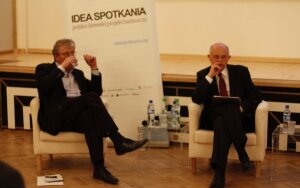- October 10, 2012
- 238
Will We Reach an Agreement with Lithuania after the Elections?

“The actions of the Lithuanian goverment are being influenced by nationalists” and “the Polish newspapers publish biased information”. These are the main theses of a discussion of Lithuanian and Polish journalists and politicians that took place inWarsaw, the motto of which was “How to reach agreement withLithuaniaafter the elections”.
On October 9th inWarsawa study ofVilniusandWarsawuniversities was presented. The study was to describe how the press of both countries reports on each other. We can learn that the topics most covered by the Lithuanian press in the years 2010-12 have been improper relations between the two countries, the protests of the Polish minority related to the education law and shopping trips toPolandfromLithuania. The Polish press, however, has been giving more coverage for the discriminating against the Polish minority, the hard financial situation ofLithuaniaduring the crisis and the problems of Polish investors, e.g. the Polish oil corporation Orlen. The results of the study are based on the information from two most important dailies on both sides of the border.
Are the Polish Journalists Making Things Worse?
The study was commented on by some of the journalists. According to Nijole Druto, Lietuvos Radijas Warsaw correspondent, the Polish press is not objective in its reporting, the tone of the Polish media is so offensive that anxiety is artificially incited and she has the impression that it is the media and the politicians that have fueled the crisis in relations between the two countries. She also condemned the actions of the „Aš myliu Lietuvą [I LoveLithuania]” reality show participants, who ostentatiously tore off the bilingual Lithuanian-Polish sings from private houses of the local Poles in Eišiškes in 2010. Druto said that Poland was not treating Lithuania as an equal partner by constantly imposing conditions and that she would like Poland to treat Lithuania like a partner, not a weaker brother and that agreement will be reached when both sides become kind to each other.
Druto was addressed by a Polish “Uwarzam Rze” weekly and “Rzeczpospolita” daily columnist and journalist, Maja Narbutt, who said that the Polish press reports describe reality as it is, they are extensive and their quantity provides evidence, that the Polish-Lithuanian relations are not good and that if it was not like that, such information would appear only once in a while, she also claimed that it is not the press that generates conflicts, but the politicians do so, as it is them who shape reality. She said that for years the singing of the agreement on Polish name spelling has been in the schedule of consecutive Lithuanian governments visiting Poland, but whenever the journalists would arrive, for strange techincal reasons, the singing is postponed and it has been like that for a long time and that Poland has stopped to treat Lithuania seriously, because if we can not reach an agreement in such simple cases, how can we cooperate by serious projects.
Both ladies do not believe that the elections will improve the situation of the Poles inLithuania.
Lithuania’s Political Development Influenced by Nationalists
According to a Polish senator, Marek Borowski, a representative of the Left and a former speaker of the Polish parliament, changes after the elections will be possible. He said that there is a chance that the new Lithuanian cabinet will be constituted differently than the present one, because the new political order will not be influenced by nationalists as Gintaras Songaila. He acknowledged, however, that the Polish-Lithuanian conflict about the name spelling, bilingual signs or land return is inveterate, and the ones responsible for the idleness are not only conservatives, but also social democrats, who had been in power before. He pointed out that some Lithuanian media describe the Polish approach toLithuaniaas “Nazi” and Polish television reporting as “Goebbels-like”.
The debate was organized by students of theWarsawandVilniusuniversities, who founded the project entitled “The Idea of Meeting”. The results of the research were presented by Irma Budnigaite and Karolina Urbonaite from the RePublica student corporation, operating as a part of International Relations and Political Science Institute of the University of Vilnius and Karolina Adamska and Irena Kołtun from the Stefan Kisielewski Polish Media Observation Scientific Club, operating as a part of the Institute of Journalism of the University of Warsaw. The research was financially supported by the Polish parlaiment,Lithuania’s foreign affairs ministry and theUniversityofWarsaw Student Government.
Source: http://pl.delfi.lt/aktualia/polska/czy-uda-sie-dogadac-z-litwa-po-wyborach.d?id=59723841
Tłumaczenie Sławek Stępski w ramach praktyk w Europejskiej Fundacji Praw Człowieka, www.efhr.eu. Translated by Sławek Stępski the framework of a traineeship programme of the European Foundation of Human Rights, www.efhr.eu.

